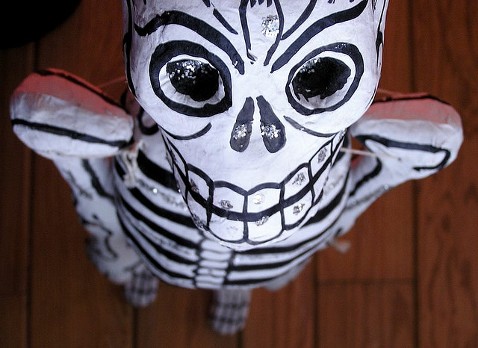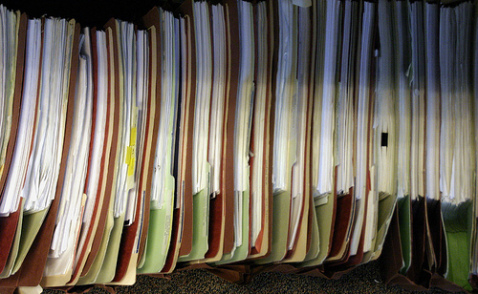la llorona
/
photo by A30_Tsitika.
I paint my face like a calavera. I don't know what I am trying to achieve, making myself look dead, but I do it. I am alone. It feels like I am doing something wrong, and in that way, I am excited. I put a base of white onto my face. It reminds me of high school and listening to the Cure and being a punk rocker. Then I pull out the black face paint crayon and draw a joy there, a swirl here. Some flowers and decorations. I am more beautiful with the mask of death.
I want to feel close to her. I want her to be amongst my posse in the afterlife, the otherworldly gang of ancestors that come when the veil between the living and the dead is thinnest, guiding me into good real estate decisions and warning me of enemies. I beckon her to come this day, the next and one after that. To rest in my arms while I dress like a calavera. We are but a whisper away from the other side. Maybe we are a coat of white face paint away.
I straddle cultures. I straddle existences. Half-white. Half-Latina. Half-mother. Half-La Llorona. I am an erstwhile Catholic and a half-assed Buddhist. I spent years living on the Mexican border in Arizona, speaking Spanish like a Chicana, and come home to a house full of Panamanians. I married a Southerner and live in New Jersey. I have attended midnight masses in four continents. I put each image of death, each candle burned, into a steaming cauldron, stew them for decades. I take some dark ideas out, adding liturgy and spells, until it is a soothing, warming bowl of ritual. Because above all else, I am a ritualist. I like rites. I like routine. I like customs. I like ceremony. I like something to do over and over because it is. What. We. Do. So I paint my face. I paint my face and I build an altar across my dining room. And I pull out the pictures of the dead.
I line up their photographs on my ofrenda. This time of year feels sacred and frightening. The leaves fall. My people fall. My grandmother. My aunt. My great-grandmother. My grandfather. My father-in-law. My daughter. So, I take a bit of them and add it to my Día de los Muertos altar. I decorate it with their funeral prayer cards, the Irish blessing written on the back. I put little bibles and prayer books. There is a rosary created by a blind nun and a bowl of fruit. I make sugar skulls. I paint a large painting of a woman crying and holding a stillborn baby. I hang it in the middle of the wall, papier-mâché skeletons flanking each side, flower lights hanging around the wooden frame.
Ssssshhhh. Don't tell anyone, but the painting is me and Lucy. It is a 16 inch by 20 inch secret done in bright acrylic. I tried to paint the Virgin Mary, but I always paint me holding Lucia and crying. It is pathological. It makes others uncomfortable. There is this show of competing artists. One of them could take pictures of nothing but clay and red dye that looked like bloody internal organs. She suffered from colitis her whole life. She tried to create other work, but she always ended up painting organs hanging from a box. I keep painting my dead daughter. I paint death because I do not show her picture in my house, except on Day of the Dead. I put her picture in this little brightly colored frame that betrays the gray of our heartbreak. I can close it up with an orange ribbon when neighbors come by. Does anyone notice our Lucy there, lips red as the sacred heart? The lips are strange and mesmerizing to me, and I have kissed them. The dead wear makeup too.
+++
Is it okay to tell you a ghost story? It is Halloween after all. Sometimes I feel like La Llorona, the Wailing Woman, who walks the edges of ponds, arroyos, the rivers, the places where water runs and her children might wash up. See, the legend goes that her children were swept away by a flash flood, carried off dead, and she, driven insane by the grief, wanders the rivers of the world looking for them. She screams and keens into the night. In another land, the legend is that she killed her children herself, threw them in the river. But the end is the same--they are gone, and she is condemned to wander the earth. But the scream is one we all know. She screams into the night, "Dios Mio! Mi hijos! Mi hijos!" or "My God! My babies! My babies!"
She is beautiful and terrifying. Every old man and woman in Mexico has a La Llorona story, even my mother. It is a ghost story, a nightmare, to lose your children. Everyone knows that. La Llorona is a warning told to children who become young adults. Do not venture out at night or La Llorona will snatch you. Do not go meet your boyfriend by the riverbed, under that beautiful weeping willow, La Llorona will steal you from us. I am both comforted that child loss is acknowledged, even in ghost stories, as something to drive you mad, condemn you for eternity, and also sad that we have such bad PR. I get La Llorona, I do. I feel condemned some days. Like La Llorona, wild hair, wild eyes, wandering the babylost rivers of the internet, wailing, "Dios Mio! Mi hija! Mija! My daughter. My daughter. Oh my God, my daughter."
This time seems wrought with ghosts and visions and the other world. Today is Halloween and Samhain, the Witches New Year. Tomorrow and the next day, the Days of the Dead. Tomorrow is Día de los Inocentes ("Day of the Innocents") also known as Día de los Angelitos ("Day of the Little Angels"). November 1st is a day set aside to honor children and babies who have died. We who wander the internet wailing have created our own culture around death, our own rituals of mourning. An angel writes our baby's name in the sand across the world. We write poetry. We light candles together. We trade skulls and hearts and ornaments.
I paint my face white, turn myself into a skull. I commune with the dead. I create elaborate altars for her. I summon her, conjure her baby form in the arms of my grandmothers and aunts. I stare into a bowl of water, scrying and crying. There is something comforting in the desperation of these motions. It is something other than wailing.
What ways do you honor the dead during Halloween, Samhain or Days of the Dead? Or if you don't, why not? What rituals have you created for yourself? For your family? Are these rituals different for your baby(ies) than for your older ancestors? Do you connect with the community of parents who have lost children during October? What rituals feel most comforting to you?


